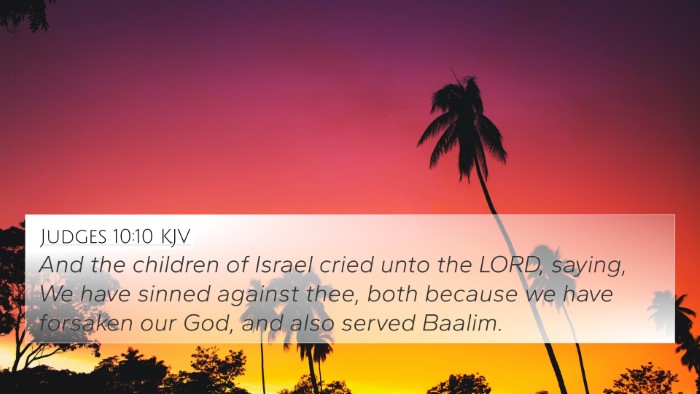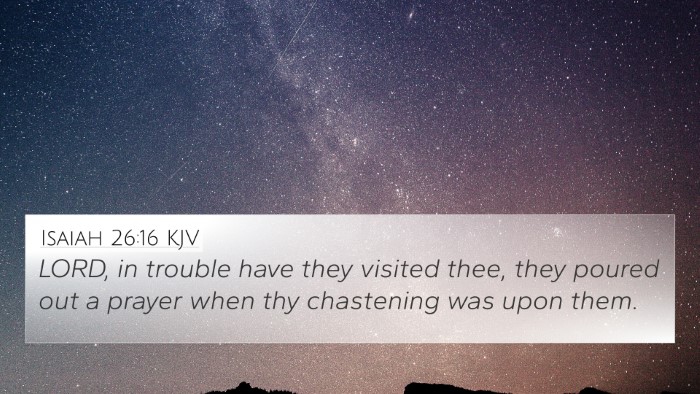Understanding 1 Samuel 12:10
1 Samuel 12:10 provides a powerful narrative of the people of Israel recognizing their sins and turning back to God after requesting a king. This verse encapsulates themes of repentance, divine sovereignty, and the consequences of the people’s choices.
Verse Context
In this chapter, the prophet Samuel addresses the Israelites, reminding them of their history and their need for God’s guidance and leadership. The request for a human king signifies a departure from relying solely on God's kingship, which brings forth a critical moment of reflection and repentance among the people.
Key Themes and Insights
- Repentance: The people confess their sins, showcasing a turning away from their previous wrongdoings. This act of acknowledgment is vital for spiritual restoration.
- God’s Mercy: Despite their faults, God remains merciful and continues to offer guidance through His appointed leaders. Samuel calls the people back to the Lord, emphasizing that returning to God brings hope and forgiveness.
- Divine Sovereignty vs. Human Choice: The desire for a human king illustrates the tension between God’s sovereignty and human choices. The request signifies a lack of trust in God’s authority.
- The Importance of Leadership: The role of leaders like Samuel is highlighted as essential for guiding the people back to faithfulness and compliance with God’s ways.
Commentary Highlights
Matthew Henry's Commentary
Henry discusses the heartfelt confession of sin by the Israelites, noting that true repentance involves recognition of wrongs. He emphasizes that God uses the circumstances of human decisions to fulfill His divine plan.
Albert Barnes' Commentary
Barnes points out the significance of the people's cry for a king, highlighting that it illustrates their desire for earthly security over divine trust. He comments on the nature of repentance, highlighting that it must be genuine and accompanied by a commitment to follow God.
Adam Clarke's Commentary
Clarke elaborates on the communal nature of sin and repentance. He notes the importance of seeking God’s favor and points toward the continuous need for spiritual renewal throughout the history of Israel.
Bible Verse Cross-References
- 1 John 1:9: If we confess our sins, He is faithful and just to forgive us our sins...
- Psalms 51:10: Create in me a clean heart, O God, and renew a right spirit within me.
- Proverbs 28:13: He who conceals his transgressions will not prosper, but he who confesses and forsakes them will find compassion.
- Isaiah 55:7: Let the wicked forsake his way, and the unrighteous man his thoughts; let him return to the Lord, that he may have compassion on him.
- Jeremiah 3:12: Go, and proclaim these words toward the north and say, 'Return, faithless Israel...'
- Luke 15:10: ...there is joy before the angels of God over one sinner who repents.
- Acts 3:19: Repent therefore, and turn back, that your sins may be blotted out...
Thematic Bible Verse Connections
1 Samuel 12:10 connects deeply with various Biblical themes:
- Repentance: As seen in the Psalms, a recurring theme of turning back to God after straying.
- Leadership and Guidance: Samuel’s role as a prophet parallels Christ as the ultimate guide.
- God’s Sovereignty: The sovereignty of God over Israel recalls themes in the Book of Esther and Daniel.
- Consequences of Sin: Reflects teachings in the New Testament about the wages of sin and the need for grace.
Inter-Biblical Dialogue
The narrative within 1 Samuel invites readers to engage in a wider dialogue across the scriptures:
- Understanding how the call to repentance in the Old Testament echoes in New Testament teachings.
- Exploring how the leadership methods of Samuel foreshadow the leadership style of Jesus.
- Considering the repercussions of Israel's choices as a cautionary tale for modern believers in their walk of faith.
Cross-Referencing Bible Study Methods
Utilize the following strategies for effective cross-referencing:
- Tools for Bible Cross-Referencing: Employ Bible concordances and digital resources to identify connections across different books.
- Bible Reference Resources: Consider accessing comprehensive guides that compile verses thematically or contextually for deeper study.
- Bible Chain References: Create chains of related verses that guide thematic explorations from one scripture to another.
In summary, 1 Samuel 12:10 serves as a profound reminder of the importance of recognizing our needs for repentance, the challenge of human leadership juxtaposed with divine authority, and the ever-present grace available from God when we turn back to Him.

















